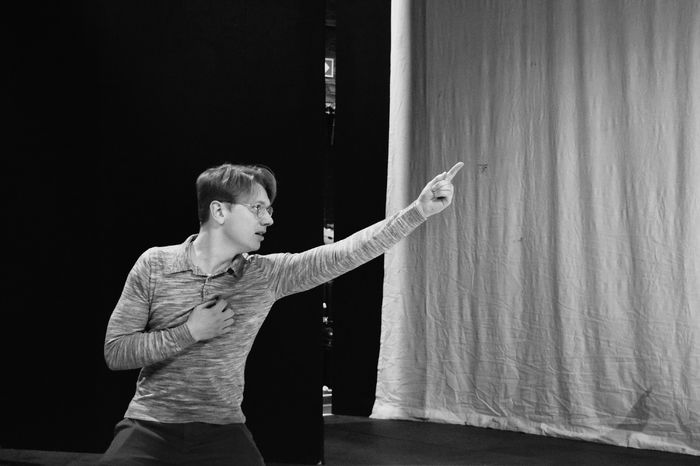God’s Property takes no prisoners in its discussion of race in Britain
For Bethan Holloway-Strong, the God’s Property cast’s excellent performances make its message all the more forceful

Set in Deptford in 1982, God’s Property is a domestic drama that extends far beyond the walls of its kitchen set. The play follows Chima and Onochie, two mixed-race brothers caught in the shockwave of the 1981 Brixton race riots. Chima, convicted for the death of a white girl, returns from prison to find his younger brother radicalised as a skinhead, denying his Nigerian roots. Ultimately, this is a play about choosing where to belong, and Hannah Shury-Smith directs it to near-perfection.
Praise must first go to the actors. From minute one, Amin Elhassan (Chima) and Ditie Eradiri (Onochie) draw the audience into their world by creating a fiery dynamic between the brothers. Elhassan’s Chima is beautifully nuanced, and his physicality is particularly effective in portraying the emotions hidden behind in the script. Eradiri plays a naïve Onochie that perfectly complements his cynical brother. Desperate to belong and having lost his fraternal relationship, Eradiri’s Onochie seems adrift in a world not built to accommodate him. A particularly spectacular monologue from Elhassan cements the central crisis of the play: where is it safe to belong, and where is it right to belong?
Elhassan and Eradiri create a fiery dynamic between the brothers
The chemistry between Anna Freeman (Holly) and Eradiri is wonderfully developed, and their parallel performances feel natural and provide some comic relief from the heavy subject matter of the rest of the play. Freeman also proves, however, that she is more than capable of taking on a much more serious role later in the play. Praise must also go to Alice Tyrell’s intimacy choreography, which goes a long way to developing the dynamic between Freeman and Eradiri. Although only a brief appearance, Ben Galvin (Liam) certainly makes his mark, gripping the audience fully in his performance. Although some moments between characters and line deliveries felt a bit disjointed, this should definitely be put down to first-night jitters. The potential of the cast is obvious, and magnificent.
The fight scenes, choreographed by Eleanor Lind Booton, are brilliant in concept, but do not reach their full efficacy in performance. This can once again be attributed to nerves on the first night, but the choreography may have benefitted from more careful consideration of the Corpus Playroom’s odd shape and the angles from which the audience views the characters.
'The potential of the cast is obvious, and magnificent.'
This play shines in its production elements. Olivia Miller’s sound design cannot be praised enough. A particularly outstanding sequence featured a montage of the characters cooking on stage, backed by a soundtrack of radio sound bites and music. Every single sound in the play added depth and meaning to the performance. Additionally, Ella Fitt’s lighting design perfectly complemented this purposeful sound design.
The set and costumes were remarkably realistic, drawing the audience further into 1982 Deptford. Ludo Tolu creates a domestic kitchen before the audiences’ eyes, complete with a loaf of bread on the counter, cups in the drainer by the sink, and rubbish in the bin. The costumes, designed by Ella Muir, add to the narrative of belonging, with Elhassan alienated from the other characters by his contrasting dress. Every production element is clearly chosen carefully, and this effort shines through in the final performance.
Simultaneously a period piece and a play for our time, Shury-Smith’s God’s Property delivers emotional punch after emotional punch. Although a few minor issues prevent it from reaching its full potential, the strong performances and beautiful production choices elevate it to another level of student theatre.
 News / Uni Scout and Guide Club affirms trans inclusion 12 December 2025
News / Uni Scout and Guide Club affirms trans inclusion 12 December 2025 News / Pembroke to convert listed office building into accom9 December 2025
News / Pembroke to convert listed office building into accom9 December 2025 News / Cambridge Vet School gets lifeline year to stay accredited28 November 2025
News / Cambridge Vet School gets lifeline year to stay accredited28 November 2025 Features / Searching for community in queer Cambridge10 December 2025
Features / Searching for community in queer Cambridge10 December 2025 News / Uni redundancy consultation ‘falls short of legal duties’, unions say6 December 2025
News / Uni redundancy consultation ‘falls short of legal duties’, unions say6 December 2025









